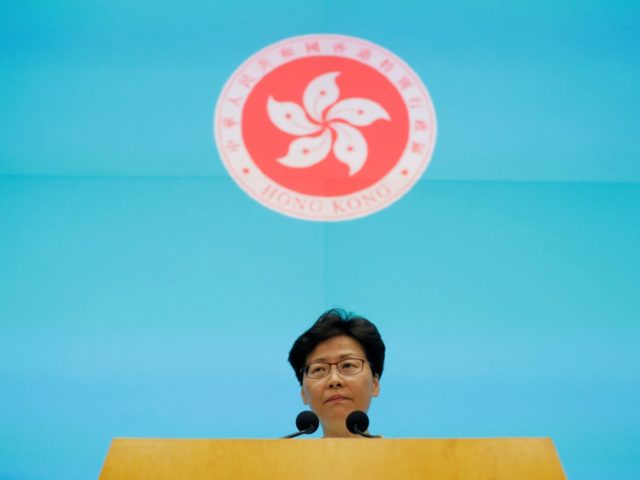A senior city official in Hong Kong told Reuters on Tuesday that China will not allow chief executive Carrie Lam to resign as protesters demanded, even if she wants to. Lam offered more unqualified contrition in her latest public statement but said she intends to remain in office.
Demonstrators scored a victory over the weekend by pressuring the pro-Beijing city government to suspend proceedings on a controversial extradition bill, which critics say would fatally compromise Hong Kong’s autonomy and place both citizens and visitors at the mercy of China’s politically compromised justice system.
Demonstrators continue to pack the streets, demanding the extradition bill’s permanent withdrawal instead of indefinite suspension, plus Lam’s resignation. The official who spoke with Reuters indicated Beijing is unwilling to accept such a humiliating outcome, predicting Lam’s resignation is “not going to happen.”
“She’s appointed by the central government, so for her to step down requires a very high level of considered discussion and deliberation at the mainland level,” the official noted.
Hong Kong’s limited autonomy does not include full-blown representative democracy, a panel heavily stacked in favor of Beijing’s interests typically appoints its senior officials. Lam’s resignation could pave the way for further demands to allow the direct election of city officials, an outcome enthusiastically desired by pro-democracy demonstrators but resolutely opposed by the Chinese Communist Party.
As Reuters’ source put it, from Beijing’s perspective, Lam’s resignation would “create more sorts of problems than it solves, at all sorts of levels.”
Reuters asked China’s Hong Kong and Macau Affairs Office if Lam would be allowed to resign, but the office did not respond.
Lam’s initial statement after the extradition bill was suspended was seen as peevish and filled with too many insults against the protest movement. She tried again on Tuesday, offering her “most sincere apology to all the people of Hong Kong” during a press conference.
“I have heard you loud and clear and have reflected deeply on what has transpired. I personally have to shoulder most of the responsibility,” she said.
Despite her more contrite attitude, Lam rejected all of the key demands made by the still-enormous protest movement, refusing to resign from her office, permanently withdraw the extradition bill, apologize to demonstrators for the use of excessive force against them, or promise that none of the demonstrators would be prosecuted. She also refused to apologize for referring to the demonstrators as “rioters,” saying she was merely following the lead of Hong Kong Police Chief Stephen Lo.
“I am still committed, passionate and I will work even harder. I hope I can secure the support from the public,” she said in response to demands for her resignation.
As for the fate of the extradition bill, Lam said she will “not proceed again with this legislative exercise” if the “fears and anxieties” of critics cannot be addressed.
“If the bill does not make legislative council by July next year, it will expire and the government will accept that reality,” she promised.
Lam’s apology was immediately and ostentatiously accepted by her political supporters and pro-Beijing politicians, and just as quickly dismissed by protest leaders, who denounced her as insincere, duplicitous, and too badly damaged to continue as chief executive.
“She is a walking disaster,” sneered opposition politician Emily Lau. “She really did not respond to any of the demands. What’s so difficult about saying ‘I will withdraw the bill?’”
One of the major organizers behind the protests, the Civil Human Rights Front, announced it was “disappointed and angry” with Lam’s apology speech because she met none of their demands and indicated protest activities will continue.

COMMENTS
Please let us know if you're having issues with commenting.